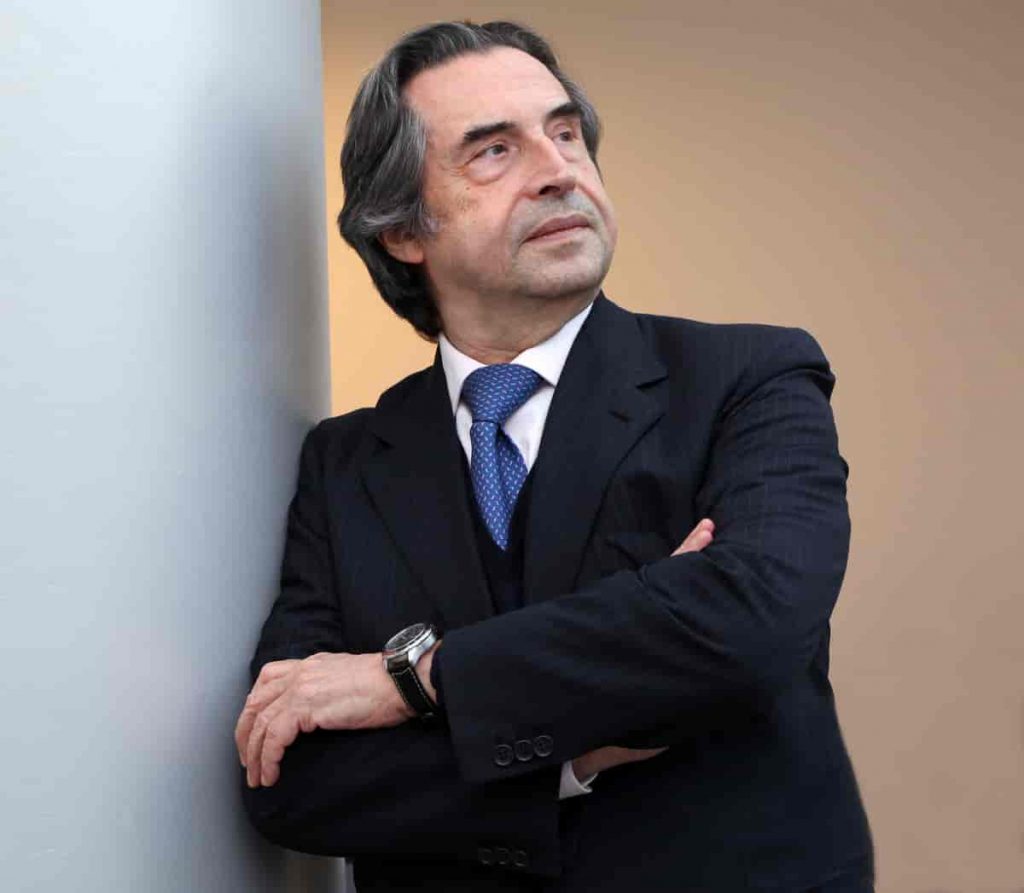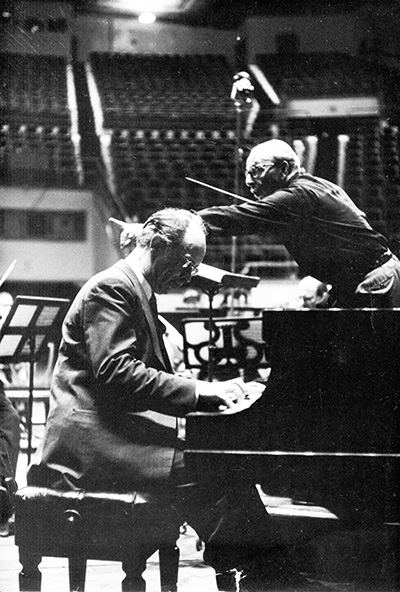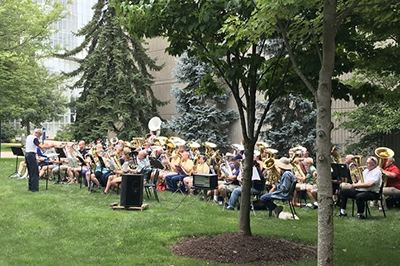By Daniel Hathaway
. Ohio Light Opera finales, three screenings of Part Two of Tolkien’s Ring trilogy at Blossom, more al fresco events in Canton & Akron
. All-Bach recital added to Oberlin Cooper agenda, Kent Blossom Festival student performances
. Almanac: anniversaries for J.S. Bach, Riccardo Muti, Sir John Barbirolli & George Szell
HAPPENING THIS WEEKEND:
It’s the last call this weekend for tickets to Ohio Light Opera performances in Wooster. You can still catch H.M.S. Pinafore (Fri. at 2), Camelot (Fri. at 7:30), No, No, Nanette (Sat. at 2), & How To Succeed in Business Without Really Trying (Sat. at 7:30). The season ends with Camelot on Sunday, July 30 at 2:00.
And have a look into the “Silver Age” of Viennese operetta with Daniel Hathaway’s interview with Emmerich Kálmán’s daughter Yvonne, who was in Wooster last week to see Arizona Lady.
J.R.R. Tolkien fans and Hobbit followers can watch three screenings of “The Lord of the Rings: The Two Towers” Friday through Sunday at 7 at Blossom with very live performances of Howard Shore’s Grammy Award–winning score by The Cleveland Orchestra, Chorus, and Children’s Chorus, Ludwig Wicki, conducting.
An early harbinger of Oberlin’s Piano Festival and Cooper Piano Competition that begin next week is an all-J.S. Bach solo recital by Ewa Poblocka (Sat. at 8).
Outdoor music includes the Canton Symphony (MusiCall of the Wild, Sat. at 6:30), the Akron Symphony, and (pictured above) Akron’s Tuba Summer 2023 (both on Sun. at 7:30).
And students studying at the Kent Blossom Music Festival will play a number of chamber music concerts beginning this weekend.
Click here to visit the ClevelandClassical.com Concert Listings page for more information.
INTERESTING READ:
“The fields of composition and contemporary performance have offered alternative paths to learning about the expressive potential of period instruments, and, intriguingly, even some historical aspects of how they were used. New music for old instruments is, of course, nothing new. Nor is the engagement by composers with varying degrees of historically informed performance. But in scouring the internet, there appear to be new directions revealing unknown aspects of old instruments.” Read Parker Ramsay’s article, Hearing New Sounds from Very Old Instruments in Early Music America here.
ALMANAC:
Friday, July 28
By Stephanie Manning

A prolific composer, Bach left behind more than a thousand works, many of which have become staples in both modern and historical performances. As his eyesight declined in the late 1740s, the composer put the finishing touches on one of his most famous pieces — one he had started working on decades earlier.
In 1724, Bach wrote the first piece that would later become a part of the Mass in b minor, but he didn’t complete the work until the last few years of his life. Though parts of it were performed in Bach’s lifetime, it was not until 1859 — more than a century after his death — that the complete work was first performed in Leipzig. Enjoy this Grammy-winning recording by the Chicago Symphony Orchestra here.

Muti is a specialist in the music of Verdi. “Each of Verdi’s operas expresses human nature in such a profound way that we often recognize ourselves in Verdi’s characters,” he said in an interview. “That’s why Verdi will always be of the moment, and he will never become old-fashioned.” Listen to him conduct the CSO in Act 2, Scene 2 of Aida on YouTube.
Saturday, July 29
By Mike Telin

Born into a musical family in London, Barbirolli began his professional life as a cellist. As a young freelancer, he played in the Queen’s Hall Orchestra and in the pit of the Beecham and Carl Rosa opera companies. Never turning down a gig, Barbirolli played with orchestras in theatres, cinemas, hotels, and dance-halls.
His first conducting experience occurred during WWI while he was serving as a lance-corporal in the Suffolk Regiment. In a 1969 Gramophone interview Barbirolli told Alan Blyth:
…. In our battalion of the Suffolks we had a number of professional musicians. So we formed an orchestra and played in the equivalent of the NAAFI [Navy, Army, and Air Force Institutes] during our spare time. I was the principal cello and we were conducted by the bandmaster, one Lieutenant Bonham. The other boys knew that I was longing to conduct and one day when Bonham fell ill with flu, they thought “old Barby” – as I was known – should have a go. It was really rather romantic — I was scrubbing the floor in the Officers’ Mess when they came and invited me to take over. We did the Light Cavalry overture and Coleridge-Taylor’s Petite Suite de Concert but I can’t say I recall the rest of the programme.
His early conducting gigs included the Guild of Singers and Players Chamber Orchestra which he helped establish in 1924, and was soon invited to lead performances of the British National Opera Company, and made his debut at the Royal Opera House, Covent Garden in 1928. He would go on to be named Arturo Toscanini’s successor as music director of the New York Philharmonic, serving from 1936 to 1943, when he was asked by the Hallé Orchestra in Manchester — which was in danger of becoming extinct — to become its conductor. Barbirolli jumped at the opportunity to help revive the orchestra. He remained there for the rest of his life.
Click here to listen to a 1944 recording of Vaughan Williams’ Symphony No. 5 with the Hallé Orchestra conducted by John Barbirolli.
Another recording Barbirolli is remembered for is the Elgar Cello Concerto with Jacqueline Du Pré and the London Symphony Orchestra. The album also includes the composer’s Sea Pictures with mezzo-soprano Janet Baker. Click here to listen.
Sunday, July 30
By Mike Telin
On this day in 1970, George Szell, Cleveland Orchestra music director for 24 years, died in Hannah House at University Hospitals — during a Blossom concert conducted by Pierre Boulez.
In his book, The Cleveland Orchestra Story “Second to None,” Donald Rosenberg recounted the evening.
That night at Blossom, the musicians were applying their efforts to Brahms’s Piano Concerto No. 1, with Mischa Dichther as soloist and Boulez on the podium, when the phone rang backstage. Szell had just died at 9:50 p.m., of complications from a heart attack he had suffered the previous month. News of Szell’s deteriorating health had spread throughout the day, but the orchestra wouldn’t learn of his death until after the concert.
Rosenberg continues —
The Plain Dealer saluted him in an editorial the next day: “Few men did more to enhance Cleveland’s reputation than did the late Groege Szell. To many people around the world he and the Cleveland Orchestra symbolized the city . . . . Szell will be best remembered for what he leaves behind — the Cleveland Orchestra. Seldom has a richer legacy been left to a city.”
It is in the spirit of legacy that I share some of my favorite Szell recordings. I’m sure many of you have your own list, so spend some time listening. And if possible, share them with a young person who may not have had the opportunity to hear the Orchestra under the direction of the late maestro.

Janáček: Sinfonietta
Dvořák: Symphony No. 7
Mahler: Symphony No 4 (Judith Raskin, soprano)
Beethoven: Piano Concerto No. 4 (Leon Fleisher)
Mozart: Piano Concerto No. 24 ( Robert Casadesus)
Dvořák: Slavonic Dances Op. 72 No. 2
Beethoven: Symphony No. 4
Beethoven: Symphony No. 9 (Choral)
Prokofiev: Piano Concerto No. 1 (Gary Graffman)
(Photo: Szell rehearsing with Rudolph Serkin)




